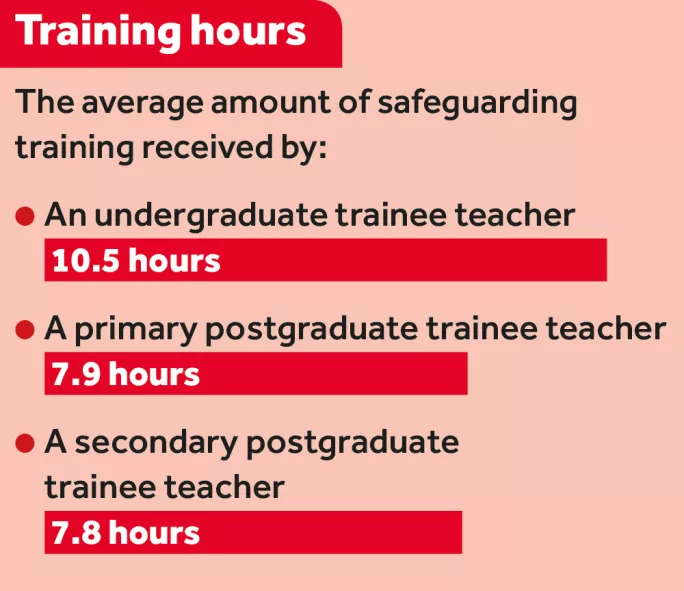The safeguarding worries at the heart of teacher training

“How long do bruises take to go down?” the six-year-old asks.
There are two possible responses to this question. One would shut down the conversation entirely. The other could flag up vital safeguarding concerns.
The problem, according to the NSPCC, is that newly qualified teachers are rarely aware of the importance of the question, let alone the correct answer.
Now research by the children’s charity reveals that trainee teachers receive barely more than a day of instruction on how to handle safeguarding cases during their initial teacher training courses.
Chris Cloke, the NSPCC’s head of safeguarding in communities, says: “Teachers are in a critical position, in having contact with the majority of children and young people. Therefore, they carry a very heavy responsibility.
“A safeguarding case could present itself in their very first week, when they’re new to school and facing other pressures as well. If they respond in an insensitive way, it could put children off talking. Children may clam up. There’s certainly the risk of making the situation worse.”
A freedom of information request by the NSPCC shows that students studying on undergraduate teaching courses receive an average of 10.5 hours of safeguarding training - equivalent to a day and a half - over a three-year or four-year course.
‘It wasn’t exactly rigorous’
Postgraduate teacher trainees, meanwhile, receive even fewer hours of safeguarding tuition. Primary trainees receive an average of 7.9 hours of safeguarding guidance over a year-long course, while secondary trainees receive only 7.8 hours.
“I think it was an afternoon,” a Hull teacher says of the safeguarding training on his PGCE at the University of York. “It was a cursory discussion of the symptoms we might be looking for, then, ‘Go forth on placement and speak to your child-protection person.’ It wasn’t exactly rigorous.”
As a result, says safeguarding consultant Andrew Hall, teachers are going into the classroom unprepared to spot or handle serious safeguarding issues. It was a teacher he worked with who encountered the question about how long bruises take to go down.

“An experienced teacher said, ‘Why? Do you have a bruise you’re worried about?’” Hall says. “Then the child showed the bruise and it was of concern. But, if you’re not trained, you would say, ‘A day or two.’ The risk when someone isn’t trained is that they take things at face value and they don’t look any deeper.
“So much in identifying concerns about children is really subtle. Over time, you’re building up a pattern of behaviours or examples about that child. But the worry is that new teachers may only be seeing the most dangerous things.”
This is not the first time that concerns have been raised about teachers’ lack of safeguarding expertise. Earlier this year, Tes reported that only half of ICT lead teachers have sufficient training to protect pupils from online radicalisation and exploitation.
And the Association of School and College Leaders and former education commissioner for Birmingham Sir Mike Tomlinson have voiced concerns that headteachers are not being given sufficient training to spot pupils who are being radicalised by extremists.
Hall believes that even when schools do discuss safeguarding issues with new teachers, it is not always effective.
“New teachers are just bombarded in the first week or two of their new job,” he says. “They can’t remember any of it and schools think they’re only topping up what trainees have already learned.”
Time for reflection
Neither he nor Cloke is willing to put a number to the teacher-training hours that should be dedicated to safeguarding concerns. “Quality as just as important as quantity,” Cloke says. “It’s about making sure that training is delivered in a way that enables teachers to feel confident - striking the right balance between not being over-alarmist and just being realistic.”
Hall would like to see new teachers and their mentors reflect on safeguarding in the way that they currently reflect on behaviour management. “I wonder how often the question is asked: were there any safeguarding concerns that you had about this class?” he says. “They’re probably not discussing safeguarding as an agenda item after every lesson. The worry of all new teachers is that they’ll walk into the class and the pupils won’t listen. Few of them think about safeguarding in that way - it doesn’t keep young teachers awake because they don’t know what they don’t know.”
You need a Tes subscription to read this article
Subscribe now to read this article and get other subscriber-only content:
- Unlimited access to all Tes magazine content
- Exclusive subscriber-only stories
- Award-winning email newsletters
Already a subscriber? Log in
You need a subscription to read this article
Subscribe now to read this article and get other subscriber-only content, including:
- Unlimited access to all Tes magazine content
- Exclusive subscriber-only stories
- Award-winning email newsletters